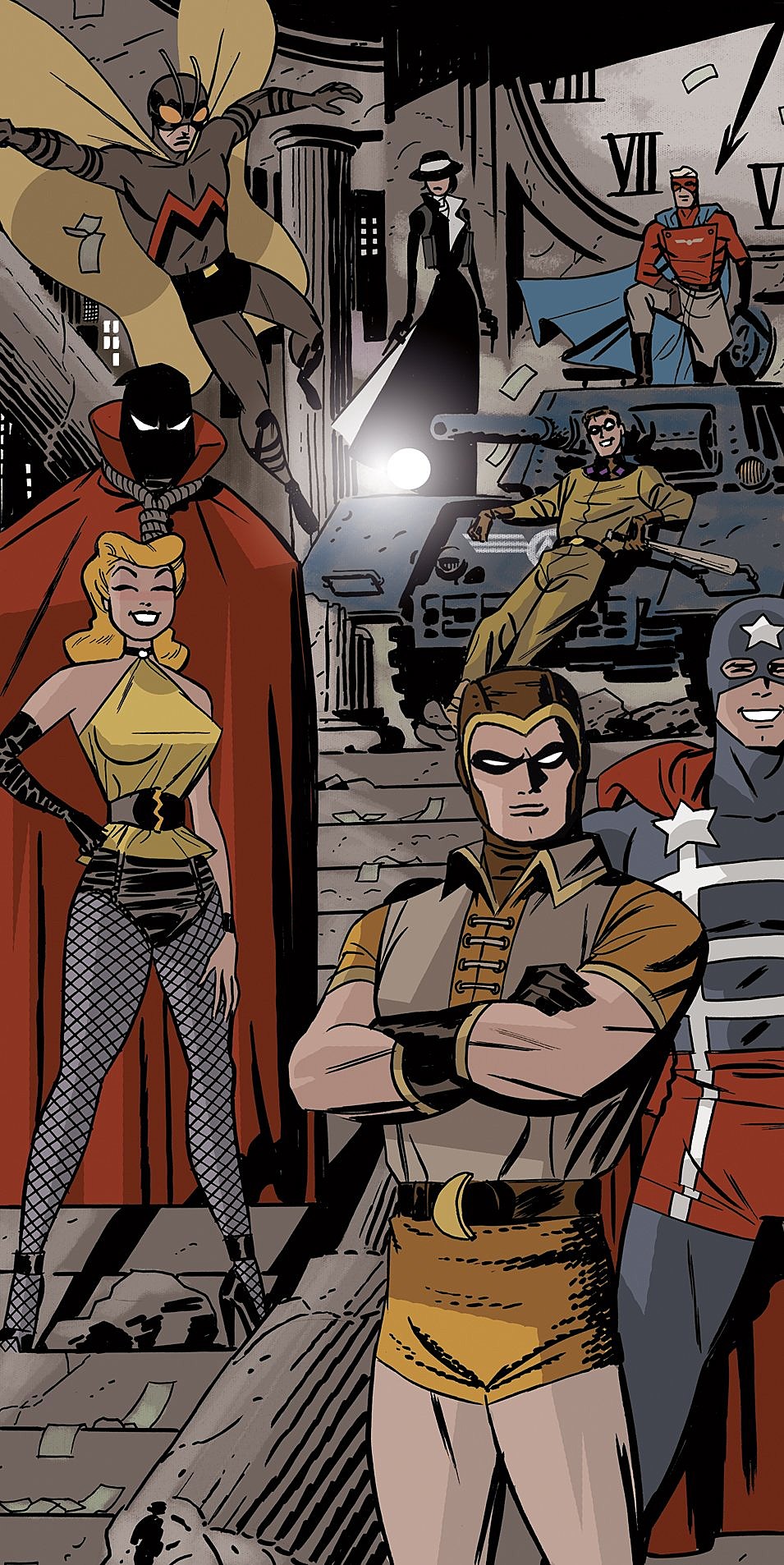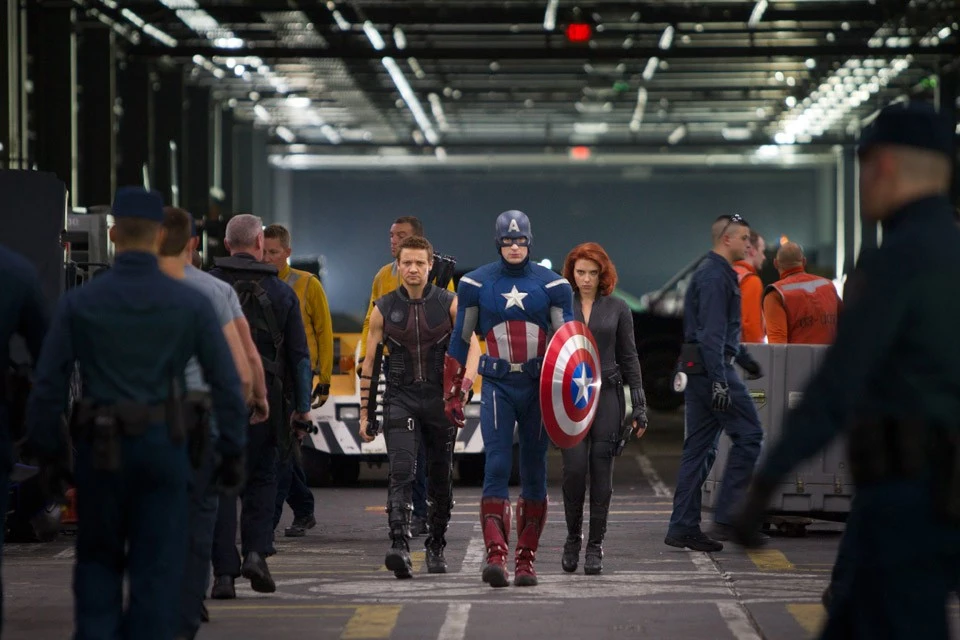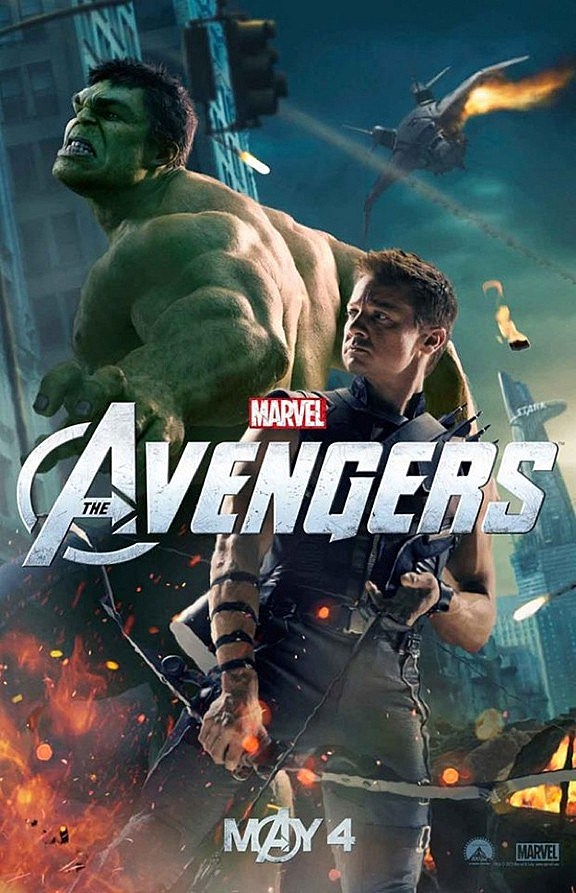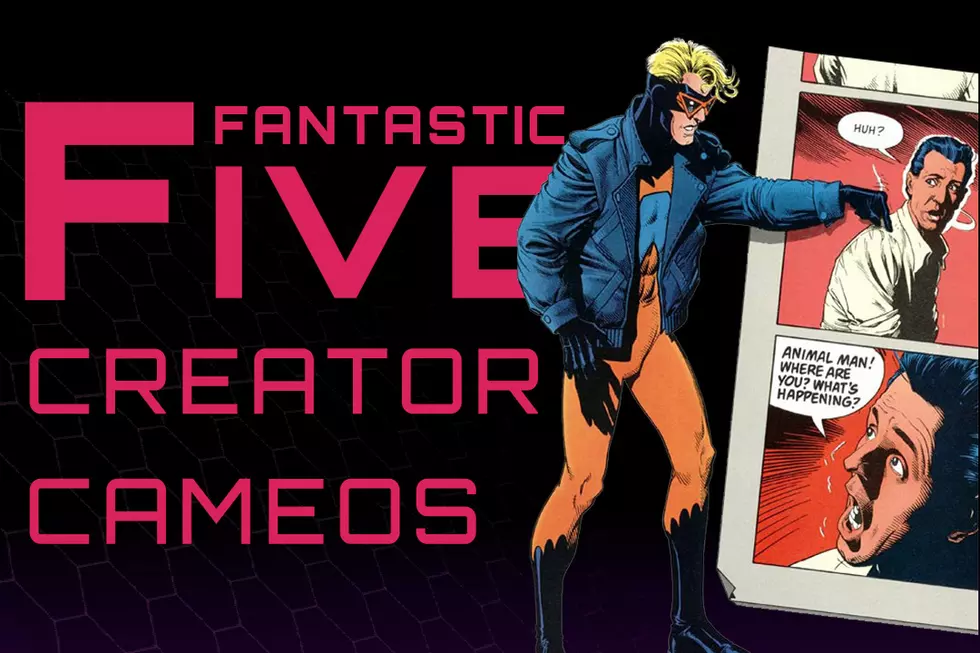![The Ethical Rot Behind ‘Before Watchmen’ & ‘The Avengers’ [Opinion]](http://townsquare.media/site/622/files/2012/04/beforewatchmenminutemen.jpg?w=980&q=75)
The Ethical Rot Behind ‘Before Watchmen’ & ‘The Avengers’ [Opinion]

I made a conscious decision to stop supporting Marvel and DC with my money a while back. This decision was a long time coming, built on the back of my increasing uneasiness with how they do and have done business. The one-two punch that pushed me over the edge into going completely cold turkey, though, were DC's announcement and press roll-out of Before Watchmen, a follow-up to the much-loved Watchmen by Dave Gibbons and Alan Moore, and Marvel's full court press on The Avengers, their film based on characters and concepts largely co-created by Jack Kirby and Stan Lee. I'm too conscious of the wrongdoings of both companies to be able to support them and not feel complicit and terrible in their exploitative and unjust practices.
My first reaction to Before Watchmen wasn't apathy, but it was close. I couldn't say that I didn't care about Before Watchmen, but I definitely didn't care enough about it to have anything but jokes about it. I like several of the creators involved, but nothing about the initiative impressed me enough to want to read the comics.
 A large part of why I'm not particularly interested in Before Watchmen is the ownership issue, and how DC has treated Moore over the years. Moore and Gibbons both signed a contract in the '80s with the reasonable expectation that their work would be returned to them once it dropped out of print and the characters weren't being used anymore. When Moore realized that he'd never get the rights back, that DC was actually using underhanded tactics to produce merchandise without paying Gibbons and Moore, and that they were about to implement a ratings system he disagreed with, he left. He decided to never work for DC again.
A large part of why I'm not particularly interested in Before Watchmen is the ownership issue, and how DC has treated Moore over the years. Moore and Gibbons both signed a contract in the '80s with the reasonable expectation that their work would be returned to them once it dropped out of print and the characters weren't being used anymore. When Moore realized that he'd never get the rights back, that DC was actually using underhanded tactics to produce merchandise without paying Gibbons and Moore, and that they were about to implement a ratings system he disagreed with, he left. He decided to never work for DC again.
He left to do comics for himself and others. In the late '90s, he launched America's Best Comics as an imprint under Wildstorm. DC bought Wildstorm, promised to not interfere in his work, and then set about pulping issues of The League of Extraordinary Gentlemen for unbelievably cowardly reasons and botching the release of The Black Dossier not once but twice. The first time, DC released the book without the vinyl record it was intended to be packaged with, claiming that it'd be put into the inevitable Absolute edition of the comic. When it came time to package and produce that Absolute, DC published Absolute Black Dossier at a price point of $99.99. What extras did you get for that price, which was eighty dollars more than the paperback? Nothing. The slipcased volume included no extra content, no scripts, no sketches, and -- wait for it -- no record.
I think it's fair to say that DC has repeatedly acted in bad faith with regards to Alan Moore. He's got every right to be upset at his treatment, to defend himself in the press, to consider himself a target of DC's disrespect, and -- and this is most telling here, with regards to Moore's motivations -- to refuse their money in exchange for his silence or acquiescence.
What tipped me over into full-on "No, never, not in my name, I'm done" status was reading an interview with J. Michael Straczynski, writer of Dr. Manhattan and Nite Owl, at Ain't It Cool News. Here's the part that bugged me the most:
When you mention that part, then they flip to the fact that Alan had a bad contract, and that makes it wrong. But how is it any more wrong than the way any comics creators were treated, especially those who came out of the Golden and Silver Age? Worse than Jack Kirby, who couldn't even get his art back in his failing years? Worse than Siegel and Shuster? I've signed my share of bad contracts - I have never received a penny in profits on BABYLON 5; my contract is such that if a set burns down on a Warner Bros. movie in Botswana, they can debit it against my share. Everyone in the entertainment business shares one truth: we make the best deal we can at that time. If it's not great, you take your knocks, lick your wounds, and try to make the next one a bit better. You don't sit there bemoaning it forever.
The problem here is that JMS looks at being screwed over as a fact of life. "How is it any more wrong than before?" is not only a disgusting question to ask, but a stupid one. This isn't the Exploitation Olympics. It's real life. Jerry Siegel and Joe Shuster didn't get a gold medal for selling the rights to the most important of the superheroes to DC for $130, and Steve Gerber didn't get one for losing the rights to Howard the Duck. They got screwed, and the minute you start thinking that that's just the way things go is the minute that you're morally compromised.
Put simpler: "Well, at least you didn't get it as bad as that guy!" is neither encouragement nor a legitimate rationale. It's scorn. It's blatant disrespect. And if this is the guy tasked with following up Moore's work... well, what am I supposed to think?

I had a conversation with a professional creator at Emerald City Comicon. He explained the Before Watchmen situation like this: Alan Moore is one of the most respected writers in comics. He has co-created, revamped, or introduced tons of things that have enriched the medium and artform. His books are routinely some of the best-crafted works around, even if they're not to your or my tastes, and he's one of the few writers in the running for Greatest Of All Time. But when he says, "Hey, listen. Please don't do more Watchmen. I've been mistreated by DC, and I think the book stands very well on its own," the response from DC and the creative teams involved is essentially, "No, [screw] you, Alan."
How gross is that?
The Avengers drives me crazy. It's always "Marvel's The Avengers," or "Joss Whedon's The Avengers." Marvel owns those characters, but Marvel didn't create them. Joss Whedon wrote and directed the movie, but they aren't his characters, either. The Avengers is based on the work of Stan Lee and Jack Kirby, not Marvel Comics or Marvel Entertainment.

Jack Kirby co-created most of the cast of that film, alongside Stan Lee and others. Marvel explicitly and undeniably screwed Kirby out of what he deserves in a series of attempts to retain the rights to his work. Once the Copyright Act of 1976 hit, Marvel realized that they had to formalize and clarify their relationships with their creators before the creators made moves to take advantage of the loose contracts to regain the copyrights to the characters they'd created for Marvel. That meant that they needed to get a handle on Kirby especially, since he was there for the creation of so many vital parts of Marvel's universe and had done thousands of pages of comics for them.
The comics industry had done a remarkably poor job with contracts before then. They had creators relinquish the rights to the characters they created, for example, by including language to that effect on a paycheck that the creators were forced to sign, lest they not be paid for their work. Another of Marvel's schemes to maintain copyright was to begin returning original art to artists -- an initiative forced into being by the strident demands of artists who felt like they were undervalued and mistreated already -- and having those artists sign a form giving Marvel full copyright in exchange for the return of the physical art. (Art that should have been returned anyway, by the way; publishers only buy the content, rather than the physical form of that content. They had no right to keep that art, and even less right to use that art as an extortion tool.)
For most artists, the form was a one-page contract. For Kirby, it was four pages. You can read the form here on The Comics Journal site, and get a good background on the fight for Kirby's artwork by Michael Dean here. Marvel offered to return eighty-eight pages to Jack Kirby. Kirby's regular schedule for in the '70s was fifteen pages a week, depending on how much outside animation work he was doing. But even then, he'd worked for Marvel for years, generating thousands of pages of work. There is a gulf as wide as the Grand Canyon between what Kirby was legally owed and what Marvel offered. Marvel's offer was an insult, at best.

In exchange for those 88 pages, Kirby would have to give up several rights. Here's an incomplete list of Marvel's requests:
-Kirby was to agree that Marvel was "the sole and exclusive owner of all copyright in and to the Artwork throughout the worid," and if the art somehow wasn't already copyright Marvel, Kirby was to cede copyright to Marvel for that, too.
-Kirby was to receive no royalties for future use of the work by Marvel.
-Kirby was forbidden from assisting others in questioning Marvel's copyright.
-Kirby was forbidden from objecting to future use or modification of his work, no matter the form it took.
-Marvel was to receive the rights to Kirby's name, likeness, and biographical info to use in their marketing or publishing as they wished.
-Kirby was not allowed to copy, publicly display, or even give away any of his artwork.
-Kirby was to give Marvel unfettered access to the artwork at Marvel's sole discretion.
-Kirby was forbidden from saying that Marvel had possession of any more of his art.
You're a reasonable human being. Does this seem at all fair to you? Does it seem like behavior due to a man who co-created Marvel's House of Ideas? They offered him eighty-eight pages and told him to forget about the thousands more he was due. This is horrible, exploitative, and unjust on every possible level. According to Marvel, Kirby was not just forbidden from enjoying the benefits of the work he had produced. He was entitled to a kick in the butt on his way out the door. This is scumbag behavior. They didn't just want his work and copyrights. They wanted his art, his face, and his voice.
Kirby didn't sign the form for obvious reasons. Marvel took a huge PR hit when his plight went public, and eventually sent him almost two thousand pages after he signed a revised single-page form.
Last year, Marvel won a summary judgment over Jack Kirby's estate. They'd challenged Marvel's assertion that Kirby's work was made for hire and lost. A little under a year later, The Avengers will hit the silver screen. How much of the millions of dollars of profit is Marvel going to send to Kirby's estate as royalties? My guess is the family will get a grand total of nary a dime. Marvel doesn't have to do anything. They won in a court of law.
Think it through. These are two titans of the medium, men who have done a metric ton of work to push the medium forward. Kirby and his collaborators gave us Captain America, the Fourth World, romance comics, the Fantastic Four, and the visual language that superhero comics use to this day. Moore and his collaborators gave us Watchmen, V for Vendetta, a literary approach to superheroes, and even more proof that comic books, no matter the content, are an art form on par with any other. Even if you don't like Kirby or Moore, you have to respect their contributions to the medium. How do you treat people who have helped elevate your craft, or pushed your chosen field toward legitimacy? We say "thank you" to people who hold doors open for us. What do you say to the people who go several steps beyond that?
Now look at how Kirby, Moore, and others have been and still are being treated by the Big Two. "No, screw you, Alan." "No, screw you, Jack." Both companies are making bank off the back of these guys in the form of movies, comics, games, toys, and everything else under the sun. Watchmen spent 108 straight weeks in the New York Times top 10 graphic books list. Kirby had a hand in the creation of Iron Man, Thor, Fantastic Four, Captain America, Nick Fury, and the Hulk, all of which have had major and successful motion pictures.

The lack of grace, of basic dignity being afforded to these guys is disgusting. The law is on the side of the corporations, but it is clear to me that Marvel and DC are morally and ethically in the wrong. They employed an exploitative, dishonest, and insulting assault on creator's rights in the past, and they're reaping the benefits of that assault now.
The Avengers movie led to me dropping Marvel because the scale of the argument has changed. Someone getting screwed when the stakes are relatively low, as they were when Marvel and DC were primarily comic book production houses, is one thing. It's horrible and unjust, yes. It can ruin lives, yes. All of this is true. But in the years since, Marvel has gone from a comic book company to an entertainment company. The Avengers alone may well crack a billion dollars in worldwide box office, assuming that people who care enough to predict those kinds of things are correct. The scale is different, and thus the stakes are, too. Before, for whatever reason (probably something along the lines of "But I like these comics!") I was willing to accept that Kirby had been screwed, but to move on.
But now Marvel is on track to make more money off one film featuring characters co-created by Jack Kirby than Kirby ever saw in his entire life -- again, mind you, since Iron Man, Iron Man 2, Thor, and Captain America have already made somewhere around two billion dollars combined gross box office -- and Marvel can't even be bothered to do anything more than give lip service to the man's legacy.
Kirby is a one-of-a-kind creator, the type of innovator whose influence will never be repeated, and his work is clearly marketable and exciting. Why not come to terms with the family, and then work on mending that fence? Why not use that newly rebuilt bridge to begin work on an actual archival Kirby line? Why not heal this gaping wound in comics history and earn some goodwill? He produced a massive amount of work for Marvel, from genre-defining work like Fantastic Four to weird-but-awesome buddy comics like his Captain America & The Falcon. There's something for everybody in there, and most of it is out of print. Why doesn't Marvel honor Kirby's legacy by making his work available to the people of the future and giving him what he's due, after years of screwing him over? You call him "King." Treat him like one.
But, no. That won't happen. Instead, we're left with "Marvel's The Avengers," as if Marvel is an entity capable of holding a pen and pencil and having ideas. And tell me: How many mainstream media outlets have you seen shouting out Stan & Jack for having the idea in the first place? For being the fathers of the style? How many comic book media outlets have done that? Precious few.

Before Watchmen made me quit DC because I finally understood that the comics industry is more than willing to eat its best and brightest, and to do it with a smile. Everything Alan Moore gave to DC, from the germ of an idea that led to the current Green Lantern comics to Vertigo existing thanks in no small part to Swamp Thing, counts for nothing. When you get right down to it, the response has been, "Well, Alan. Them's the breaks, yeah? Sign a better contract next time, bro. Live and learn."
I'm not perfect, but I can't live with that level of dishonesty. It's a shame, but it's one thing when these kind of injustices are just kind of a vague idea that you read somewhere once. You can ignore or justify the sins of the past in your head with, "oh, it was the time," or "things are better now." But once these sins become concrete and crystal clear, once you have the knowledge of exactly how poorly your heroes and the people who had such a profound effect on your childhood or adult life have been treated... well, that's harder to ignore.
"Hey, man, Sammy got beat up last weekend" will elicit a gasp of worry and well wishes. "Hey man, six thugs broke into Sammy's house, tied him to the radiator, broke his fingers with a hammer, and then turned the radiator on high" will elicit disgust and rage. You can ignore or handwave away vague crimes. That's a lot harder to do when you find out exactly what happened. When you know, you have to confront yourself.
I grew up on Marvel comics. I wouldn't be the voracious reader I am today without Spider-Man and the X-Men. My vocabulary would be halved. I still remember learning the word "vernacular" from X-Men and where the Adirondacks were because X-Force used to live there. My life has been immeasurably enriched by these comics, but when I look past the comics to the people who made them, I see a trail of ugly business decisions and weak justifications. That poisons the well.
The people are what makes comics go, not the characters. Many of the men and women who crafted the best stories of my life, up to this very day, were treated poorly, whether due to editorial shenanigans, being screwed over by fellow creators, or being casualties of amoral business decisions. That's disgusting.

At this point in my ongoing evolution, I'm too conscious of and disgusted by the actions of Marvel and DC to be able to support them in good conscience. It's a decision that's really messing with me, in fact. Marvel's characters in particular are near and dear to my heart, and I genuinely appreciate the work of people like Greg Rucka, Butch Guice, Mark Waid, Clayton Cowles, Paolo Rivera, Jeff Parker, Sara Pichelli, Zeb Wells, Fred Van Lente, Ed McGuinness, Gabriel Hardman, Marjorie Liu, and more. But I can't do it. Every time I go to buy something new, I think of Marvel and DC's past and current behavior as corporations and I can't bridge that gap. Maybe I'm wrong. Maybe I'm right. It feels like the right decision, though, and that feels good.
I'm going to miss a lot of comics I would have otherwise enjoyed, but this is a decision I feel like I had to make. No comics. No shoes. No Avengers. No Before Watchmen. No movies. No stunts. I'm not even publicly proclaiming that I'm quitting while secretly reading scans of their comics in the dark. I quit cold turkey. I'm done putting money in their pockets. It bums me out, but that's life.
-Tom Spurgeon's "Sometimes They Make It Hard To Ignore Creators Issues" and "Twenty-One Not Exactly Original Notes On More Watchmen, Written At A Slight Remove"
-Ryan Dunlavey & Fred Van Lente's Comic Book Comics #5 [preview]
-Image Comics publisher Eric Stephenson's "NO FUN"
-Chris Mautner's "We've come so far: On Before Watchmen and creators rights"
-Michael Dean's "Kirby and Goliath: The Fight for Jack Kirby's Marvel Artwork"
-Kurt Amacker interviews Alan Moore.
-Frank Miller's "Keynote Speech By Frank Miller To Diamond Comic Distributors Retailers Seminar, June 12th, 1994" (from the pages of Sin City: The Big Fat Kill #5)
-The Comics Journal's "The Four Page Agreement"
-Milo George & The Comics Journal's The Comics Journal Library: Jack Kirby
-Michael Dean's "Marvel/Disney's Win Against Jack Kirby Heirs Not About Fairness" and Kirby and Goliath: The Fight for Jack Kirby's Marvel Artwork"
-Gary Groth's "Jack Kirby Interview"
-Steven R Bissette's "Marvel/Disney v Kirby: Part 2" and "Marvel/Disney v Kirby: Do Avengers Avenge... Or Not?"
-This incredibly relevant Youtube clip from The Wire, if you need a pithy explanation on how depressing creators' rights can be
More From ComicsAlliance






![Super7 ReAnimates Alien and Predator, Masters More of the Universe [Toy Fair 2017]](http://townsquare.media/site/622/files/2017/02/IMG_2000.jpg?w=980&q=75)

![The Wild, Tear-Filled World of Heartbreak: The Best Romance Comic Covers Ever [Love & Sex Week]](http://townsquare.media/site/622/files/2017/02/featured1.png?w=980&q=75)
